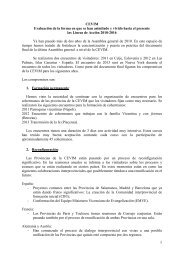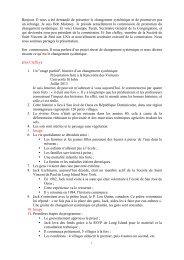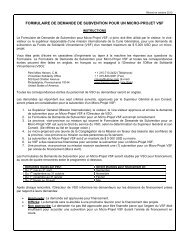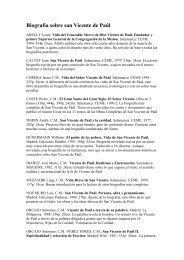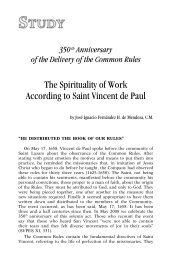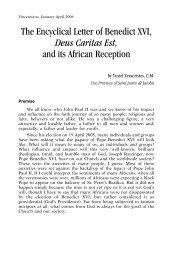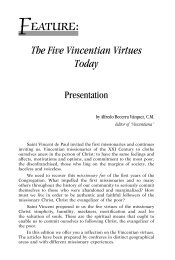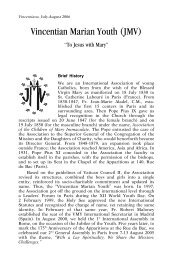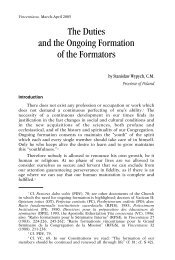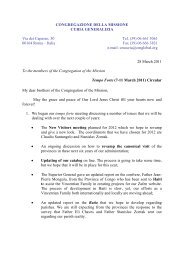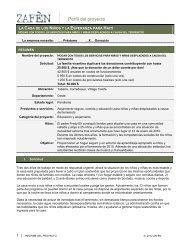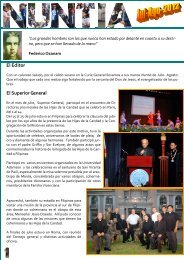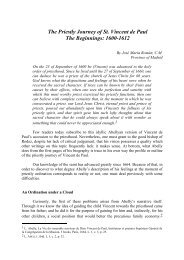Ongoing Formation of Religious - CMGlobal
Ongoing Formation of Religious - CMGlobal
Ongoing Formation of Religious - CMGlobal
Create successful ePaper yourself
Turn your PDF publications into a flip-book with our unique Google optimized e-Paper software.
VINCENTIANA 1/2-2008 - INGLESEApril 17, 2008 − 4ª BOZZA100 Cyril de SouzaDiscovering the etymology <strong>of</strong> the word transformation gives us abetter understanding <strong>of</strong> what it implies. The word transformation ismade up <strong>of</strong> two Latin words, trans and forma, where trans couldmean “across, over, on the other side.” In combination with forma itwould literally mean “a change <strong>of</strong> form” and, according to its use, itcould refer to any type <strong>of</strong> change, as for instance, a change <strong>of</strong>character, or <strong>of</strong> clothing style, or even more importantly <strong>of</strong>consciousness. 15It is this kind <strong>of</strong> transformation that we will look into now;however, at the very outset, it should be pointed out that it is acomplex process involving thoughts and feelings. Transformationallearning has far-reaching consequences on personality, more thanany other kind <strong>of</strong> learning. It is a learning experience that shapes thelearner and produces a significant impact to the point <strong>of</strong> affecting thelearner’s subsequent experiences. In a transformational learningprocess one’s “meaning perspective” changes; “meaning perspective”refers to one’s overall world view, which comprises specificknowledge, values and beliefs. Usually one’s meaning perspective ispassively formed right through one’s life experiences in childhood,during the youthful years and in young adulthood. These elementsserve as a filter in perceiving the present reality and in determininghow to organize and interpret one’s current experiences. Through theprocess <strong>of</strong> ongoing formation the religious should acquireself-knowledge and, by rational discourse and critical reflection,explore the depth and meaning <strong>of</strong> the elements that make up one’sworldview in order to produce a more inclusive worldview. Thesuccess <strong>of</strong> the outcome is rated by the development <strong>of</strong> greaterautonomy as a person, 16 which in a way also defines the condition <strong>of</strong>adulthood.Transformational learning can be attained only to the extent thatone uses the tools <strong>of</strong> critical reflection and rational discourse in orderto arrive at a self-knowledge that is total, deep and long-lasting(psychological effects). In the same strain it should be added that thistransformational learning reorganizes one’s perspective and willseriously affect the intimacy <strong>of</strong> relationship and vision that one has<strong>of</strong> God and other spiritual realities (spiritual effects). “The fulldevelopment <strong>of</strong> religious values and Christian sanctity in a soul is15Cf. M. STEIN, Transformation. Emergence <strong>of</strong> the Self (A & M UniversityPress: Laredo 1998), p. 51; see also: B. BAYNHAM, “Transformation,” inM. DOWNEY (Ed.), The New Dictionary <strong>of</strong> Catholic Spirituality (Liturgical Press:Collegeville 1993), p. 967.16Cf. J. MEZIROW, Transformative Dimension <strong>of</strong> Adult Learning (Jossey-Bass: San Francisco 1991) pp. 145-146.



